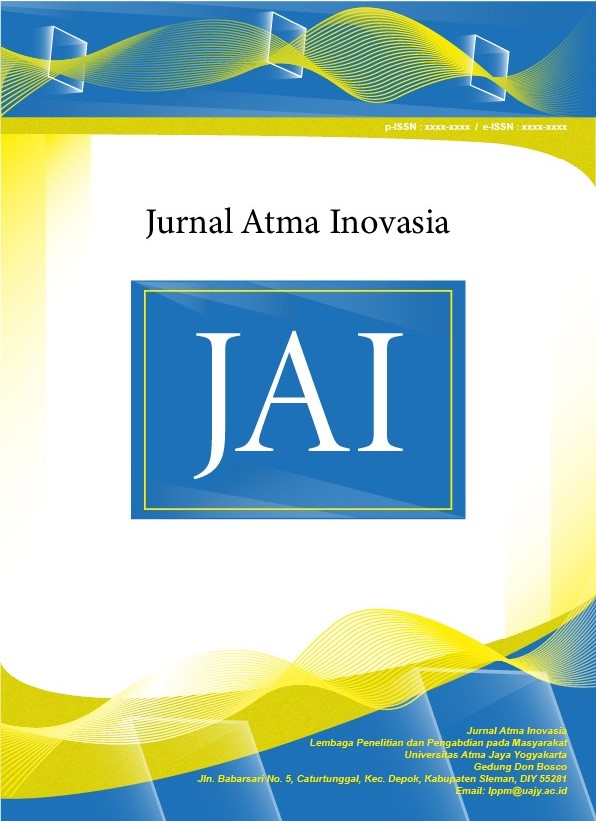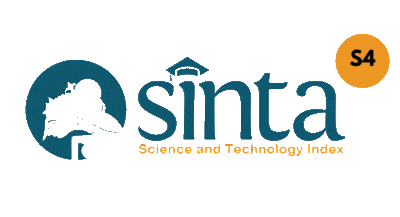Building Resilient Ex-Migrant Families in Resapombo Village, Blitar
DOI:
https://doi.org/10.24002/jai.v5i3.11096Keywords:
resilient, ex-migrants, family communicationAbstract
Family relationship changes occur due to economic and social disruption. The community service aims to empower ex-migrant families in Resapombo Village, Blitar. Resilient families are characterized by strong family bonds, harmonious relationships, and effective communication patterns. Meanwhile, the ex-migrant families have experienced long separations, difficult communication, and financial problems that eventually influenced the family harmony, that included the husband, wife and children, and economic stability. Programs implemented were a family harmony workshop on communication and resilience, a school seminar at SMKN 1 Doko on sexuality and reproduction, and training for cadres. The result of the workshops was creating a cadre team of eleven people by selecting and guiding candidates to assist families in conflict resolution and support. The seminar at school was such a success that the next programs were organized in the future.
References
[1] Harmanik, “Kabupaten Blitar dalam Angka, Blitar Regency in Figures 2023,” 2023 [Online]. Available: https://blitarkab.bps.go.id/publication/2023/02/28/109dff6913d3399abfaa8f3e/kabupaten-blitar-dalam-angka-2023.html. [Accessed 20 March 2024]
[2] A. Welianto, “Faktor Penyebab Terjadinya Migrasi,” 2020. [Online]. Available: https://www.kompas.com/skola/read/2020/07/10/213500469/faktor-penyebab-terjadinya-migrasi?page=all. [Accessed 20 March 2024]
[3] P. Amelasasih and A. S. Wicaksono, “Pendampingan Ketahanan Keluarga Ibu Pelaku Usaha Desa Surowiti,” Conscilience: Jurnal Penelitian dan Pengabdian Masyarakat, vol. 1, no. 2, p. 63, Oct. 2023, doi: 10.30587/jc.v1i2.6250.
[4] L.K. Palindangan, “Pola Komunikasi Ibu Anak pada Keluarga Buruh Migran Perempuan di Wonosobo, Jawa Tengah,“ Jurnal Ilmu Komunikasi dan Bisnis, vol. 3, no. 2, pp. 141-151, 2018.
[5] A.P. Hadi,. "Tinjauan terhadap berbagai program pemberdayaan masyarakat di Indonesia." Yayasan Agribisnis/Pusat Pengembangan Masyarakat Agrikarya (PPMA) (2009).
[6] S. Kemmis, R. McTaggart, and R. Nixon. "Introducing critical participatory action research." The action research planner: Doing critical participatory action research (2014): 1-31.
[7] A. McIntyre,. Participatory action research. Sage publications (2007)
[8] N.E. Fitria and D. Hamdayani, "Pemberdayaan Perempuan melalui Pelatihan Kesehatan Reproduksi pada Remaja Putri SMA Adabiah 2 Kota Padang." Jurnal Abdi Mercusuar, vol. 4, no. 2, pp. 046–052, Dec. 2024, doi: 10.36984/jam.v4i2.551.
[9] F. Ali, F. A. Gharaibeh, and M. Awais, “Work–Family Conflict and Conflict Resolution Styles of Married Academicians: An Application of Relational Turbulence Theory,” The Family Journal, Mar. 2025, doi: 10.1177/10664807251321520.
[10] S. Solisa, K. rofiah Khofi, and A. Awatiszahro, “Hubungan Pengetahuan Remaja tentang Kesehatan Reproduksi dengan Perilaku Seksual Remaja Kelas Xi di SMA 3 Jombang,” Jurnal Mahasiswa Kesehatan, vol. 4, no. 2, pp. 131–141, Mar. 2023, doi: 10.30737/jumakes.v4i2.4485.
[11] F. Axmedshina, “The Concept Of Equal Parenting: A Solid Foundation For Family Well-Being (World Practice),” American Journal Of Social Sciences And Humanity Research, vol. 4, no. 8, pp. 151–157, Aug. 2024, doi: 10.37547/ajsshr/volume04issue08-10.
[12] T. R. Wulan et al., “Ayah Tangguh, Keluarga Utuh : Pola Asuh Ayah pada Keluarga Buruh Migran Perempuan di Kabupaten Banyumas,” Jurnal Ilmu Keluarga dan Konsumen, vol. 11, no. 2, pp. 84–95, May 2018, doi: 10.24156/jikk.2018.11.2.84.
[13] A.T.N. Afriliani, V. Adriany, and H. Yulindrasari, “Peran Ayah dalam Pengasuhan: Studi pada Keluarga Pekerja Migran Perempuan (PMP) di Kabupaten Sukabumi,” Jurnal Ilmu Keluarga dan Konsumen, vol. 14, no. 2, pp. 164–175, Jun. 2021, doi: 10.24156/jikk.2021.14.2.164.
[14] W. Utamidewi, D. Mulyana, and E. Rizal, “Pengalaman Komunikasi Keluarga pada Mantan Buruh Migran Perempuan,” Jurnal Kajian Komunikasi, vol. 5, no. 1, p. 69, Jun. 2017, doi: 10.24198/jkk.v5i1.7901.
[15] D. Baumrind, R. E. Larzelere, and E. B. Owens, “Effects of Preschool Parents’ Power Assertive Patterns and Practices on Adolescent Development,” Parenting, vol. 10, no. 3, pp. 157–201, Aug. 2010, doi: 10.1080/15295190903290790.
[16] Alfaeni, D.K. Nur, and Y. Rachmawati. "Etnoparenting: Pola pengasuhan alternatif masyarakat indonesia." Aulad: Journal on Early Childhood 6, no. 1 (2023): 51-60.
[17] M. Suwarjono, “Pembentukan Posyandu Remaja Sebagai Upaya Peningkatan Pengetahuan dan Kualitas Kesehatan Remaja di Dusun Dingkikan, Sedayu, Bantul,” Jurnal Atma Inovasia, vol. 2, no. 4, pp. 419–423, Jul. 2022, doi: 10.24002/jai.v2i4.5836.
[18] E. S. S. Mutia, F. Siti Fatimah, and M. Zia Ulhaq, “Edukasi asuransi kesehatan pada remaja pranikah desa donorojo, Kabupaten Magelang,” Jurnal Atma Inovasia, vol. 3, no. 2, pp. 186–190, Mar. 2023, doi: 10.24002/jai.v3i2.6943.
[19] H. S. Wardhani, D. Hariani, N. Ducha, and N. A. Syamsudi,"Pelatihan Konseling Sebaya bagi Siswa SMA tentang Kesehatan Reproduksi, Seks Bebas, dan Pernikahan Dini," Jurnal Abadimas Adi Buana, vol. 8, no. 01, pp. 51–61, Jul. 2024, doi: 10.36456/abadimas.v8.i01.a8742.
[20] D. T. Pakasi and Reni Kartikawati. "Antara kebutuhan dan tabu: pendidikan seksualitas dan kesehatan reproduksi bagi remaja di SMA." Makara Seri Kesehatan Volume 17, no. 2 , pp 79-87. 2013.
[21] T. N. Djama, "Kesehatan reproduksi remaja." Jurnal Kesehatan, vol. 10, no. 1, p 14-18. 2017.
Downloads
Published
Issue
Section
License
Copyright (c) 2025 Amelberga Vita Astuti, Nobertus Ribut Santoso, Sekhar Candra Pawana, Sherly Hindra Negoro, Brahma Putra Pratama, Felix Bimo Aryoputro

This work is licensed under a Creative Commons Attribution-ShareAlike 4.0 International License.










